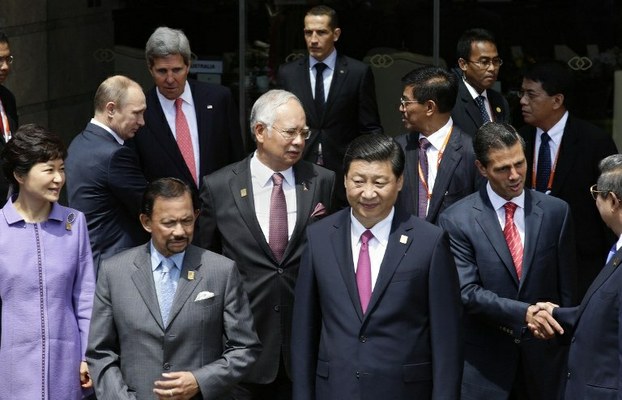




The absence of U.S. President Barack Obama from a key Asia-Pacific leadership summit this week has enabled China to project its growing role in the region as it steps up ties with nations in its own interest, analysts said on Tuesday.
China, which had a higher-than-usual profile as the host of next year's summit, took every opportunity to boost its regional influence in Obama's absence this week at the Asia Pacific Economic Cooperation (APEC) meeting on the Indonesian island of Bali, commentators said.
Vowing to work together on a trade deal due by the end of this year, APEC's leaders also pledged to drive a global recovery and implement “prudent and responsible” policies.
However, Obama's absence—blamed on the government shutdown in Washington—has raised questions about U.S. commitment to its “Asia pivot” policy.
China and Russia
Russian president Vladimir Putin told a news conference at the end of the summit on Tuesday that Russia and China have more contacts linked to cooperation than areas of competition, highlighting a potential counterweight to U.S. power.
"There is competition somewhere and there is cooperation somewhere else," Putin told reporters. "Today, we have more contacts with China linked with cooperation."
Citing developing collaboration over energy, aircraft building, natural resources, transport, and infrastructure, Putin said trade between Russia and China is growing and is expected to reach U.S.$57 billion dollars in 2013.
Wu Fei, professor in the school of Journalism and Communication at Jinan University, who recently returned from several months' research in the U.S., said concerns about Beijing's growing influence are linked to its willingness to forge bilateral ties with other countries in its own interest.
"Whenever China and Russia enter into any sort of agreement, this weakens the United States," Wu said.
Testing ground
But he said Obama's absence at APEC is unlikely to have any long-term effects on policy.
Instead, Wu said he saw this year's APEC as something of a testing ground for Beijing's ability to balance geopolitical interests.
"I think that the important thing about this summit has little to do with China's high-profile role, but more to do with China's abilities as an integrative influence," Wu said.
"China is trying to do this now, but whether or not it will be successful remains to be seen," he said.
'Distracted' from Asia pivot
Regional newspapers saw Obama's absence as highly significant for U.S. influence, however.
"[It seems] the "Pivot to Asia" policy of President Obama has not been smoothly implemented as he had planned," an opinion piece in Thailand's Bangkok Post said on Tuesday.
"This is because while trying to implement the policy, the U.S. government was often distracted by both domestic and international political problems."
Meanwhile, the Jakarta Post said in an opinion article: "President Obama’s decision to not attend what Asia sees as an important diplomatic event has reinforced the perception that the “Asia pivot” is indeed not sustainable."
And Vietnam's Tuoi Tre Online said in an editorial: "Nations ... view the president's absence as an indication of the United States' decline, or simply that of an unstable partner."
'Unlikely to change much'
Retired Toledo University international politics professor Ran Bogong said China's relatively high-profile role at the leadership summit had resulted from Obama's absence.
"The fact that China is leading the APEC forum is a very good opportunity both for China and for [President] Xi Jinping," Ran said. "However, this is a temporary phenomenon, which won't affect long-term U.S. policy in Asia."
"U.S. influence in Asia is unlikely to change much just because Obama didn't attend this meeting."
Regional trade agreements
Ran said a key focus for discussion at the APEC leadership summit was Washington's proposed Trans-Pacific Partnership (TPP) trade agreement for the region. APEC, which was set up in 1989 to advance free trade and investment, now groups 21 Asia-Pacific countries.
U.S. Secretary of State John Kerry this week pushed ahead with lobbying efforts for an agreement on the TPP, which excludes China,and which has been snubbed by Indonesia, Southeast Asia's largest economy.
China is meanwhile pursuing a similar agreement with 16 partner countries in the Asia-Pacific region to boost trade and economic cooperation.
Xi told the APEC business forum after clinching tens of billions of dollars' worth of trade deals on visits to Jakarta and Kuala Lumpur: "China will commit itself to building a trans-Pacific regional cooperation framework that benefits all parties."
The state-run English-language China Daily framed the move as a direct move against the TPP.
"The Trans-Pacific Partnership, featuring confidential talks and the highest free trade standard beyond mere lower tariffs, is widely considered a new step for the U.S. to dominate the economy in the Asia-Pacific region," the paper said.
However, Ran said the TPP was unlikely to replace APEC any time soon.
"I don't think [the U.S.] will succeed in this," Ran said. "The U.S. is an important leader within APEC, and it should continue to cooperate with China and other countries [in this forum]."
He said China's close trading relationships with other APEC members, in particular Australia, were unlikely to be affected by the TPP or other new alliances in the region.
Reported by An Pei for RFA's Mandarin Service. Translated and written in English by Luisetta Mudie.